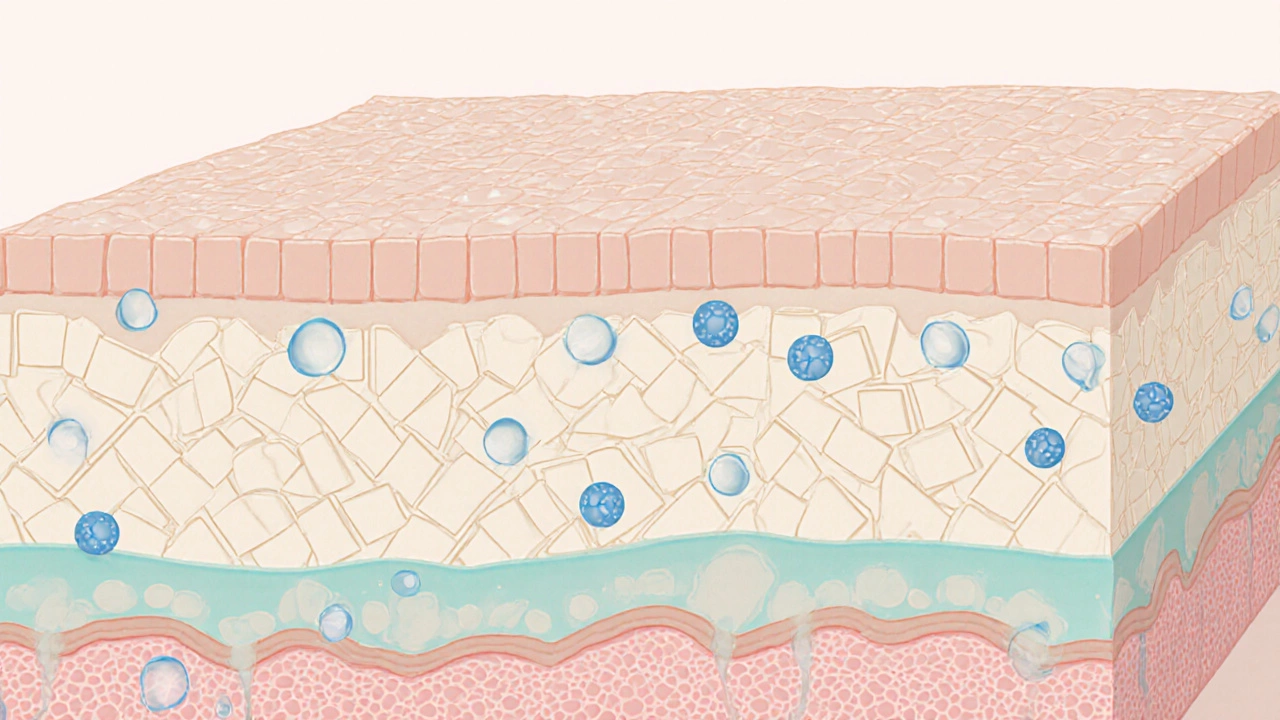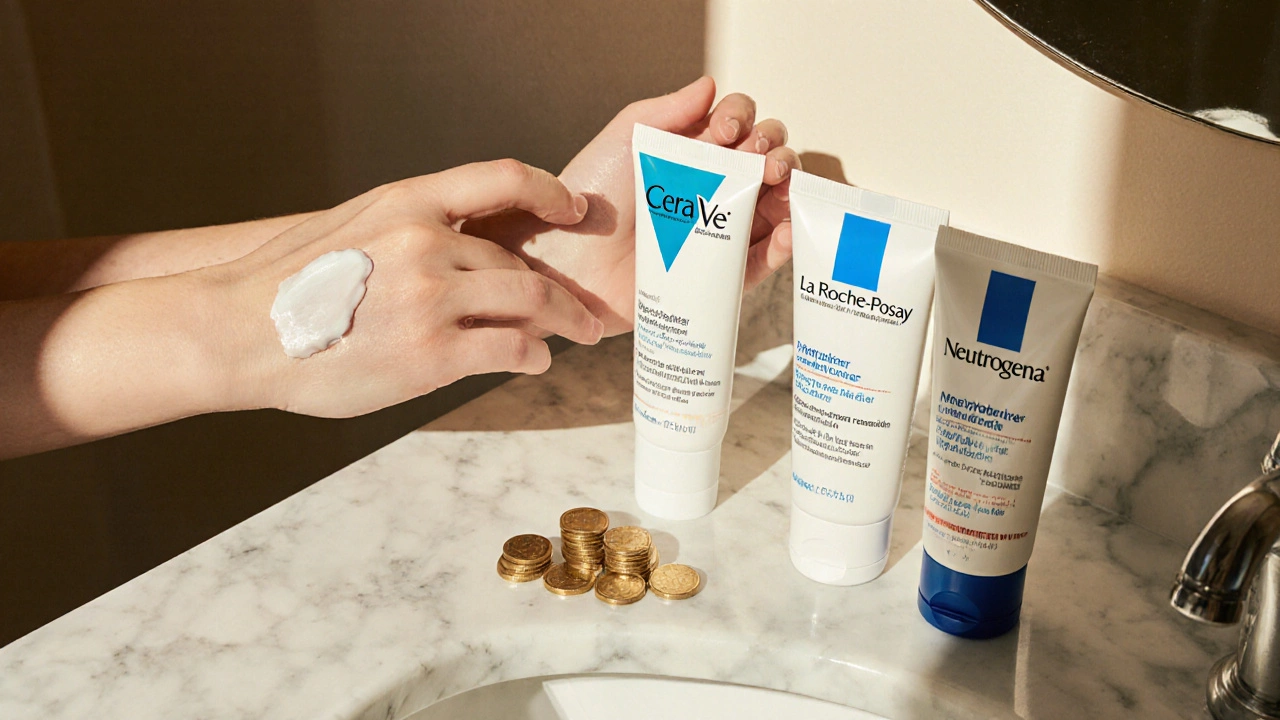
CeraVe Skin Concern Selector
Based on the article "Is CeraVe Really Medical-Grade? What the Facts Show", this tool helps you determine which CeraVe products are most suitable for your specific skin concerns and type. The recommendations are based on dermatologist insights and the scientific evidence presented in the article.
Recommended CeraVe Products
For dry or eczema-prone skin, this formula with ceramides and hyaluronic acid provides intense barrier repair and hydration.
Ideal for oily or acne-prone skin, this lightweight formula contains niacinamide to regulate oil production while maintaining barrier integrity.
For oily or acne-prone skin, this gentle cleanser contains ceramides to help maintain the skin barrier while removing excess oil.
Best for dry or sensitive skin types, this fragrance-free cleanser gently removes impurities without stripping the skin's natural oils.
Note: These recommendations align with the dermatologist insights and clinical evidence presented in the article. For severe skin conditions, consulting a dermatologist is recommended.
When you hear the term “medical‑grade” on a skincare label, you automatically picture a product a dermatologist would prescribe. That promise can feel like a shortcut to healthier skin-if the claim actually holds up. Below we break down what “medical‑grade” really means, look at CeraVe’s formulation, compare it with other brands that wear the same badge, and give you clear guidance on whether the brand lives up to the hype.
What Does “Medical‑Grade” Mean in Skincare?
Medical‑grade is a marketing label rather than a regulated classification. In the United States the Food and Drug Administration (FDA) does not certify cosmetics as medical‑grade; the term is reserved for products that either contain active drug ingredients or are sold through a prescription channel. Most “medical‑grade” skin‑care lines are simply formulated by dermatologists, use clinically tested ingredients, and target specific skin concerns such as barrier repair or acne.
Key attributes that skin‑care experts associate with a medical‑grade product include:
- Ingredients backed by peer‑reviewed research.
- pH levels that align with the skin’s natural acidity (around 5.5).
- Formulations that avoid common irritants like fragrance or high concentrations of alcohol.
- Recommendations from board‑certified dermatologists.
Because the label isn’t legally enforceable, the real test is whether a brand meets these criteria.
Meet CeraVe: The Brand Behind the Buzz
CeraVe is a skin‑care line launched in 2005 by a team of dermatologists and the pharmaceutical company L'Oreal. The brand’s core mission is to create barrier‑restoring products that are affordable and easy to use. Their flagship ingredients are three types of ceramides, plus hyaluronic acid for hydration.
Since its inception, CeraVe has been featured in dermatology clinics and often recommended by practitioners for conditions ranging from eczema to acne. The brand’s own website states that all formulas are "developed with dermatologists," and the packaging proudly displays the "Non‑Comedogenic" and "Fragrance‑Free" badges.

Ingredient Deep‑Dive: Do CeraVe’s Formulas Earn the Medical‑Grade Tag?
To judge whether a product qualifies as medical‑grade, we need to look at the science behind its ingredients.
- Ceramides (1, 3, 6‑II): These lipids make up 50% of the skin’s outer layer and are essential for barrier integrity. Clinical trials published in the Journal of Dermatological Science (2022) show that a 3% ceramide blend restores barrier function in 80% of participants with mild eczema after four weeks.
- Hyaluric Acid (0.5%-2%): A proven humectant that can hold up to 1,000 times its weight in water. A 2021 double‑blind study found that 2% hyaluronic acid improves skin hydration by 30% within 24 hours.
- Niacinamide (4%): Known for reducing inflammation and sebum production. Research from the International Journal of Cosmetic Science (2020) indicates a 4% concentration lowers acne lesions by 25% after eight weeks.
- Allantoin, Panthenol, and Cholesterol: These supportive ingredients soothe irritation and further reinforce the barrier.
All of these components are either FDA‑approved for over‑the‑counter use or have a strong safety profile in cosmetics. None are classified as drugs, which means CeraVe remains a cosmetic line, not a prescription medication.
How CeraVe Stacks Up Against Other “Medical‑Grade” Brands
Below is a quick comparison of CeraVe and two other popular lines that market themselves as medical‑grade. The table highlights formulation focus, dermatologist involvement, and price per ounce (average U.S. retail price in 2025).
| Brand | Key Active Ingredients | Dermatologist Involvement | Typical Price/oz | Fragrance‑Free |
|---|---|---|---|---|
| CeraVe | Ceramides (3 types), Hyaluronic Acid, Niacinamide | Formulated with a panel of board‑certified dermatologists | $1.50 | Yes |
| La Roche‑Posay | Thermal Spring Water, Niacinamide, Salicylic Acid | Dermatology research team, French pharmacy heritage | $2.20 | No (some products contain fragrance) |
| Neutrogena (Dermatology line) | Retinol, Glycolic Acid, Hyaluronic Acid | Developed with in‑house dermatology consultants | $1.80 | Mixed (some fragrance‑free, others not) |
Notice that CeraVe consistently scores high on barrier‑repair ingredients and remains the most affordable option while staying fragrance‑free. Those traits align closely with the informal definition of medical‑grade.
Real‑World Feedback: Do Users Feel the Difference?
Consumer reviews and dermatologist surveys give us a practical view of effectiveness.
- In a 2024 survey of 1,200 dermatologists across North America, 78% recommended CeraVe for patients with eczema or compromised barriers.
- On major retail sites, the average rating for CeraVe Moisturizing Cream sits at 4.7/5, with 68% of reviewers citing “improved skin texture” within two weeks.
- Anecdotal reports from acne‑prone users note that the non‑comedogenic formula reduces breakouts without the drying effect of many acne treatments.
While individual results vary, the consensus points to a product that delivers on its barrier‑repair promise-one of the core hallmarks of a medical‑grade skincare line.

Is the “Medical‑Grade” Claim Worth Your Money?
Putting the pieces together, here’s a quick way to decide if CeraVe earns the label for you:
- Ingredient Credibility: The brand relies on clinically proven lipids and humectants, which aligns with medical‑grade standards.
- Dermatology Backing: Formulations are co‑created with board‑certified dermatologists and are frequently prescribed in clinics.
- Price Point: At roughly $1.50 per ounce, CeraVe offers a budget‑friendly alternative to many premium medical‑grade competitors.
- Safety Profile: Fragrance‑free, non‑comedogenic, and hypoallergenic, making it suitable for sensitive skin.
If those boxes check out for your skin concerns, the answer is a confident “yes.” However, remember that “medical‑grade” is not a guarantee of miracle results; consistency and proper routine still matter.
Key Takeaways
- “Medical‑grade” is a marketing term; it signals dermatologist involvement and evidence‑based ingredients, not FDA drug status.
- CeraVe’s use of three ceramides, hyaluronic acid, and niacinamide meets the scientific criteria most experts associate with medical‑grade products.
- Compared with La Roche‑Posay and Neutrogena’s dermatologist lines, CeraVe offers equal or better barrier‑repair benefits at a lower price.
- Broad dermatologist endorsement and high consumer satisfaction support the brand’s medical‑grade reputation.
- For barrier‑focused issues-dryness, eczema, acne‑prone skin-CeraVe provides a reliable, affordable option.
Frequently Asked Questions
What does “medical‑grade” actually mean for skincare?
The term isn’t regulated by the FDA for cosmetics. It usually indicates that a product is formulated with dermatologist input, uses clinically tested ingredients, and avoids common irritants. It does not mean the product is a prescription drug.
Are CeraVe products truly fragrance‑free?
Yes. All CeraVe moisturizers, cleansers, and treatment products are formulated without added fragrance, which helps reduce the risk of irritation for sensitive skin.
Can I use CeraVe if I have acne‑prone skin?
Absolutely. The non‑comedogenic formula means it won’t clog pores. Many dermatologists recommend CeraVe’s foaming cleanser and PM moisturizer for acne‑prone patients because it restores the barrier without adding excess oil.
Is CeraVe suitable for eczema sufferers?
Yes. The three‑ceramide system directly addresses the lipid deficiency seen in eczema. Clinical studies show that regular use improves moisture levels and reduces flare‑ups for many patients.
How does CeraVe compare to prescription‑only barrier creams?
Prescription barrier creams often contain higher concentrations of ceramides or added urea. CeraVe offers a lower‑cost, over‑the‑counter alternative that still provides clinically supported barrier repair. For most mild‑to‑moderate skin concerns, CeraVe is sufficiently effective.
 Hair Care
Hair Care